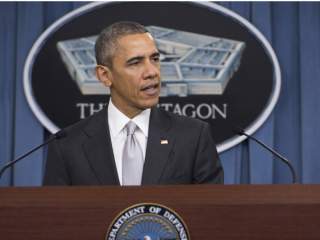ISIS and the Take-Out Myth
The exploitation of the ISIS issue in American politics no doubt will continue and continue loudly, but we should hope that its infection of U.S. policy will be kept to a minimum.
Even just limiting our purview to ISIS itself, there is nothing unique about the territory that it happens to control at the moment in Iraq and Syria. The group already is repeating some of the same pattern of decentralization as Al Qaeda, with pieces on the periphery possibly being more threatening than the original core. Libya, where there is much well-founded doubt about the impact of the recently announced agreement between the rival regimes there, is a prime place where we might wake up to find the most viable part of ISIS. Taking out the group in Iraq and Syria would be only a stage in more campaigns and occupations elsewhere in the Middle East.
As for the type of threat that most concerns Americans—terrorism inside the United States—the taking out of ISIS positions in Iraq and Syria simply does not translate into the removal of such a threat. Such terrorism, time and again, has not depended on some group's control of real estate in the Middle East or South Asia. The San Bernardino shootings certainly did not depend on it. Many incidents outside the Middle East have been described with some accuracy as “inspired” by ISIS. The state of the ISIS enclave in the Middle East, and whether it is advancing or shrinking, does have something to do with how much would-be terrorists elsewhere are inspired by it. But you cannot take out an inspiration. And people have long been inspired—some of them inspired to do very destructive things—by what is dead as well as what is living.
A major U.S. or U.S.-led military campaign in Syria and Iraq would play into the hands of ISIS in terms of ideology and messaging, which have at least as much to do with inspiration as control of real estate does. Such a campaign would be seen by many as confirming the ISIS narrative of this group standing up for Muslims against the attacks of the non-Muslim West. More specifically it would be seen as confirming the group's apocalyptic prophecy about armed confrontation between itself and the infidels. A substantially enlarged U.S. military campaign would be counterproductive partly by adding to the group's credibility in this respect and thus to its power to inspire. It also would be counterproductive insofar as it added to the collateral damage—which there will be even without carpet bombing—that produces anger and resentment that in turn inspires still more anti-U.S. terrorism.
The exploitation of the ISIS issue in American politics no doubt will continue and continue loudly, but we should hope that its infection of U.S. policy will be kept to a minimum.
Paul R. Pillar is a contributing editor to The National Interest. He is also a nonresident senior fellow at the Brookings Institution and a nonresident senior fellow at Georgetown University’s Center for Security Studies.
Image: Flickr/Ash Carter.

